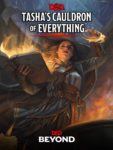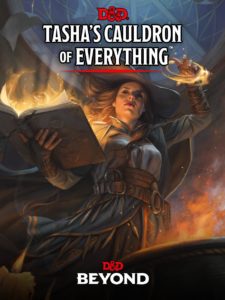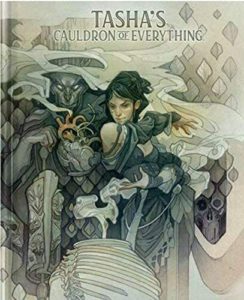D&D&D: Dungeons & Dragons and DEI (Tasha’s Cauldron)
 I feel like a broken record, but the Dungeons and Dragons role playing game continues to gain traction, particularly with the college/young adult set. Whether it is streamers, or pop culture icons (I suppose some are both) the hobby continues to make inroads to mainstream culture. The pandemic actually helped, as players turned to digital ways to connect and play with friends. When the current 5th Edition came out in 2014, it had been greatly revamped to make the game simpler and faster for new players while attempting to reclaim much of the early flavor of the game. Not content to sit on their laurels, for the past couple years, the makers of D&D (Wizards of the Coast) have gone to diversity training and are now putting out resources and other changes to make the game friendly to people of all walks of life. The creators have realized that it is just a game, and while it is an important one to many people there is no reason to have rigid rules on the “right” way to handle races, classes, and gender types. Several recent releases and themes continuing into the summer months give players even more ways to make their fantasy worlds their own. Kicking off this new direction was Tasha’s Cauldron of Everything, released last fall (2020.)
I feel like a broken record, but the Dungeons and Dragons role playing game continues to gain traction, particularly with the college/young adult set. Whether it is streamers, or pop culture icons (I suppose some are both) the hobby continues to make inroads to mainstream culture. The pandemic actually helped, as players turned to digital ways to connect and play with friends. When the current 5th Edition came out in 2014, it had been greatly revamped to make the game simpler and faster for new players while attempting to reclaim much of the early flavor of the game. Not content to sit on their laurels, for the past couple years, the makers of D&D (Wizards of the Coast) have gone to diversity training and are now putting out resources and other changes to make the game friendly to people of all walks of life. The creators have realized that it is just a game, and while it is an important one to many people there is no reason to have rigid rules on the “right” way to handle races, classes, and gender types. Several recent releases and themes continuing into the summer months give players even more ways to make their fantasy worlds their own. Kicking off this new direction was Tasha’s Cauldron of Everything, released last fall (2020.)
Tasha’s Cauldron of Everything
 Last fall, Tasha’s Cauldron of Everything was released containing the largest new chunk of player character options since Xanathar’s Guide to Everything. Tasha’s book also includes the very first entirely new character class since the start of 5th edition – the Artificer (a bit of a steam-punk style magic user who favors gadgets.) Tasha’s was well received by the community and had record-breaking sales numbers. In addition to the new character class, every other class was also given changes or new options. In particular, I feel like the book recognizes that D&D is just a game. It is what player’s make it out to be and thus the mechanics don’t always have to be tied rock solid to standard tropes and settings.
Last fall, Tasha’s Cauldron of Everything was released containing the largest new chunk of player character options since Xanathar’s Guide to Everything. Tasha’s book also includes the very first entirely new character class since the start of 5th edition – the Artificer (a bit of a steam-punk style magic user who favors gadgets.) Tasha’s was well received by the community and had record-breaking sales numbers. In addition to the new character class, every other class was also given changes or new options. In particular, I feel like the book recognizes that D&D is just a game. It is what player’s make it out to be and thus the mechanics don’t always have to be tied rock solid to standard tropes and settings.
The biggest change, perhaps, is the reworking of ability scores for different races. Rather than saying all dwarves just have extra constitution, the game designers realized that it isn’t game-breaking for someone to have a dwarf who is extra-smart instead. In fact, it allows players to choose their race independently from their chosen class since players aren’t pressured into looking at those races who are a better ability “fit” for their preferred class. Honestly, I’m surprised it took this long to figure that out. It’s a great idea and seems quite freeing. You are free to play in your personal world where race and ability scores are restricted, but there is no good game-mechanic reason why other people shouldn’t be able to use ability score bonuses to customize their character further.
In the same vein, Tasha’s also has new abilities for every class. Some are optional replacements for previous class abilities while others are straight up new enhancements. Once again, freedom of choice seems the norm. For example, spellcasting classes get new spells added to their available list. Most of the new enhancements however, provide ways for players to adjust their characters as they develop, rather than be locked in due to some poor choice early in their character’s career. Do you find your initial cantrips (reusable 0-level spells) no longer a good fit for what you want your character to do? Well, now there are rules that say you can swap it out every few levels. The options still preserve some of their theme. Sorcerers can do a cantrip swap every few levels, while the traditionally more flexible Wizard class can swap out cantrips after every long rest.
I’m particularly impressed with the designers choice to include class ability replacements. They have consistently said they never wanted to invalidate existing class options, so once a class was put out there, it was there for good. However, the Ranger class has always been a bit of a poster child for classes on the weaker side of things. The designers have made an end-around to their rules by creating new Ranger options that simply replace previous class abilities. So, no previous character needs to be changed, yet many of these new options seem a bit more powerful (at least are more combat-oriented) so that players can play with a ranger with a bit more “juice” as it were. The designers get to have their cake and eat it too! There are a few other ability-replacement options, but the ranger one sticks out in particular. As you can tell, I’m a huge fan of all this increased player choice. I suspect most DMs have typically been generous to players who find their character no longer seems to fit their character conception and allowed the occasional change-a-roo to what would normally be a fixed choice. All Tasha’s Cauldron does is codify those rules to make it easier to do so in a more “official” capacity.
The other big innovation of Tasha’s is the idea of sidekicks. Sidekicks are NPCs who can play on the players’ side – typically controlled by the players but could also be controlled by the DM. The idea is to create something that helps to pad out a smaller party (it is hard to find a good adventuring balance with only one or two players) but remains simple to run at a table so that it doesn’t bog down the game. Sidekicks had appeared in a simple form previously in the beginner-friendly D&D Essentials kit, but the new rules in Tasha’s include ways to create a sidekick out of almost any creature (humanoid or not!) I can easily imagine playing with younger players who want to adventure around with a pet. Other, smaller, bits of the book include a few new spells, rules or suggestions for how to run a patron for a player group, and some thoughts and suggestions of injecting puzzles into one’s game.

The alternate cover version only found in game stores.
Taken as a whole, Tasha’s is my favorite supplement to 5th edition so far. It takes the idea of “hey, let’s not arbitrarily limit players, and make things as flexible as we can in every area of the game” and runs with it as far as it can. While it might bend the canon a bit (no longer forcing halflings to be all about dexterity) it doesn’t do any real damage to the mechanics of the game. The expansions to race and class options provide players even more tools with which to customize their character and allow them to stray away from traditional (albeit fantasy) stereotypes.





Discussion Area - Leave a Comment